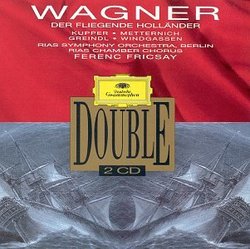| All Artists: Wagner, Fricsay, Riasso, Riascc Title: Der Fliegende Hollander Members Wishing: 0 Total Copies: 1 Label: Polygram Records Release Date: 8/15/1995 Genre: Classical Styles: Opera & Classical Vocal, Historical Periods, Modern, 20th, & 21st Century Number of Discs: 2 SwapaCD Credits: 2 UPC: 028943971423 |
Search - Wagner, Fricsay, Riasso :: Der Fliegende Hollander
 | Wagner, Fricsay, Riasso Der Fliegende Hollander Genre: Classical
![header=[] body=[This CD is available to be requested as disc only.]](/images/attributes/disc.png?v=430e6b0a) ![header=[] body=[This CD is available to be requested with the disc and back insert.]](/images/attributes/disc_back.png?v=430e6b0a) ![header=[] body=[This CD is available to be requested with the disc and front insert.]](/images/attributes/disc_front.png?v=430e6b0a) ![header=[] body=[This CD is available to be requested with the disc, front and back inserts.]](/images/attributes/disc_front_back.png?v=430e6b0a) |
Larger Image |
CD Details |
CD ReviewsValuable Harvey C. Greisman | Wilmington, DE USA | 10/06/2005 (4 out of 5 stars) "Josef Metternich gives a restrained and lyrical performance in the title role: It is free of dramatic excesses one hears in other interpretations, and the voice has a warmth and pathos that are appealing. His death earlier this year went largely unreported; while not exactly unknown in his lifetime, this baritone's talents have been commonly overlooked, despite his successes at The Met. The conductor, Ferenc Fricsay, began his distinguished career as the leader of a military band. Some traces of his early training may be discerned in the precise, crisp, and disciplined reading he gives the score. Historians have recently examined the duration of nineteenth century performances, and have discovered that, even without cuts, Wagner's operas were played a good deal faster than they are today. While it is unlikely that he was aware of this, Fricsay navigates the Dutchman at speeds which may have appeared excessive fifty years ago, but that are now likely viewed as historically accurate. Sad to relate, he did not live past his 50th birthday. Annelies Kupper's style belongs to another age, even considering this early '50s recording. Maybe her training and initial career in the provinces (Breslau) explains some of this. I personally don't find this troubling, but some might cast her voice as material for old B-movie operatic send-ups. Her stentorian take on the music is unsuited to the role of a dreamy, impressionable young girl, yet she does her level best with her considerable, but incongruent, talents. The chorus is top-drawer, and there can be few complaints about the supporting roles: Sieglinde Wagner, Ernst Haefliger, and Wolfgang Windgassen, whose Act III cavatina nearly upstages everyone else. About Acts: This recording retains the once customary practice of dividing the work into three acts. I found this refreshing at a time when revisionist musicology has sought illusory purism in a Cult of Authenticity. After seeing the Dutchman performed on several occasions,I wonder if the idiosyncratic demands of its plot preclude satisfactory staging. Maybe I've just been unlucky. Or maybe this is an example of the vocal repertoire that is better heard than seen. Anyway, there are some superior pages in the score,and this vintage recording does them justice." 5 stars for the performers - 3 for the recording. Alan Montgomery | Oberlin, Oh USA | 05/25/2006 (5 out of 5 stars) "I have this performance on the old Heliodor label - a reissue at the time. The sound was certainly acceptable and, after a moment or two, the age fades away. Metternich is just as the other review says. His lyric approach gives us plenty of drama, but it also gives us a world weary approach that gains stature as the opera progresses. It does not wear out its welcome either. Kupper sings relatively well, although she can't erase the sound of Rysanek in the role. Windgassen shows how lovely his voice could be when endurance was not a key issue. Griendl tended later in his career to have a voice of aged leather. Here he is fresher and creates a likable papa. Ernst Haefliger as the steersman is luxury casting that Culshaw would have appreciated.
Fricsay leads a taut performance, aiming at propulsion without undue speed and clear textures without undercutting the Wagner "sound." This is early Wagner, and here it sounds more related to Rienzi than a precursor to the Ring. One caveat - there are some traditional cuts, notably the second verse of the Daland/Dutchman duet, part of the long duet with Senta and part of the festive scene that opens Act 3. But these were traditional at the time, and I'm not so sure but what they aren't good ideas." |

 Track Listings (15) - Disc #1
Track Listings (15) - Disc #1